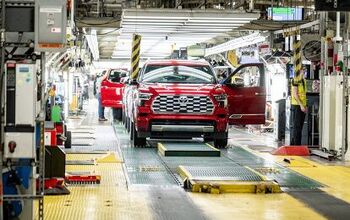Take a Break and Read This Story About GM's Ignition Switch Lawsuit. Now.

I realize for many of you the lunch hour is probably over by now, but there’s enough time before the end of the afternoon to read, digest and regurgitate repeatedly over Atlanta magazine’s epic telling of one family’s lawsuit against General Motors for their faulty ignition switches.
Seriously, it’s great. Go read it. Take a sandwich or something.
I’ll cover for you at work, no prob.
The story doesn’t divulge any new details about the case that aren’t already public: GM made bunk ignition switches that could unexpectedly shut off, disabled safety equipment, and proved fatal for 124 people. Meanwhile, the automaker noticed the ignition switches could fail, but GM changed the part without notifying regulators, which turned out to be the smoking gun in lawsuits against “old” General Motors.
But what the story does provide is a deeply personal background on the investigation by attorneys and the automaker, and subsequent roadblocks thrown up by GM on the way to its record settlement with families and the near-record fine by the government.
From the story:
Dressed casually compared to most days—plaid button-down shirt, suede shoes, no jacket—(attorney for a victim’s family, Lance Cooper is) still angry over GM’s settlement with the Justice Department. He brings up Stewart Parnell, the 61-year-old head of a peanut butter company in southwest Georgia, who in 2015 was sentenced to 28 years in prison for ordering the shipment of a paste contaminated with salmonella that caused nine deaths.
“At some point in time, GM’s conduct became reckless, and then it almost became intentional because they weren’t doing anything about what they knew,” Cooper says as he readjusts the white square napkins around his red sandwich basket. “Their conduct has caused well over 100 deaths at this point—I’m sure there were more unreported—and they have to pay a fine.”
The story paints a grim picture of a Georgia woman that was killed when her Chevrolet Cobalt shut off, spun off an interstate and plunged into a river. The woman’s family sued General Motors and a car dealership that had inspected her car just the day before the crash, after she told her father that the car would “simply shut off while she was driving it, and she’d have to pull over to the side and restart it,” according to the story.
The family eventually settled with GM, before they learned that one of its lead engineers lied during depositions in that case about whether he knew the ignition switch had changed. The family sued General Motors again and settled again, but Cooper’s involvement in the case strikes a chord with how difficult it is to take on behemoth corporations for gross misconduct. Laws won’t save us, he thinks:
Over the years, as he’s represented victims and survivors of horrific car accidents, Cooper has come to believe that federal regulations can do only so much. Corrupt corporate execs and engineers, he’s concluded, will always find ways to game the system. “You have to have some regulation,” says Cooper, who describes himself as an economic conservative. “But more often than not, regulations don’t work to protect people. That’s why you need the jury trial.” Not surprisingly for a liability attorney, Cooper sees the threat of seven- and eight-figure awards as the biggest incentive for car companies to do the right thing. Fear of litigation trumps fear of the federal government.

More by Aaron Cole
Latest Car Reviews
Read moreLatest Product Reviews
Read moreRecent Comments
- Funky D The problem is not exclusively the cost of the vehicle. The problem is that there are too few use cases for BEVs that couldn't be done by a plug-in hybrid, with the latter having the ability to do long-range trips without requiring lengthy recharging and being better able to function in really cold climates.In our particular case, a plug-in hybrid would run in all electric mode for the vast majority of the miles we would drive on a regular basis. It would also charge faster and the battery replacement should be less expensive than its BEV counterpart.So the answer for me is a polite, but firm NO.
- 3SpeedAutomatic 2012 Ford Escape V6 FWD at 147k miles:Just went thru a heavy maintenance cycle: full brake job with rotors and drums, replace top & bottom radiator hoses, radiator flush, transmission flush, replace valve cover gaskets (still leaks oil, but not as bad as before), & fan belt. Also, #4 fuel injector locked up. About $4.5k spread over 19 months. Sole means of transportation, so don't mind spending the money for reliability. Was going to replace prior to the above maintenance cycle, but COVID screwed up the market ( $4k markup over sticker including $400 for nitrogen in the tires), so bit the bullet. Now serious about replacing, but waiting for used and/or new car prices to fall a bit more. Have my eye on a particular SUV. Last I checked, had a $2.5k discount with great interest rate (better than my CU) for financing. Will keep on driving Escape as long as A/C works. 🚗🚗🚗
- Rna65689660 For such a flat surface, why not get smoke tint, Rtint or Rvynil. Starts at $8. I used to use a company called Lamin-x, but I think they are gone. Has held up great.
- Cprescott A cheaper golf cart will not make me more inclined to screw up my life. I can go 500 plus miles on a tank of gas with my 2016 ICE car that is paid off. I get two weeks out of a tank that takes from start to finish less than 10 minutes to refill. At no point with golf cart technology as we know it can they match what my ICE vehicle can do. Hell no. Absolutely never.
- Cprescott People do silly things to their cars.

































Comments
Join the conversation
"The report said the engineer that designed the switch became aware of the easy-twist to “off”, redesigned the part to require more torque, and quietly arranged to have the same part number used for the revision" Aye, there's the rub. A corporation has the responsibility to train its quality and engineering staff to bring these concerns to management with the knowledge that there will be no repercussions. A corporation can't just pay lip-service to this, but has to constantly reinforce this culture of quality, especially when the lives of the customers could be in danger. That said, if this "culture of quality" is also constantly at odds with profitability and the existence of the company, and an engineer might make that bad decision.
This reminds me of the last GM car inn my household, a '69 Firebird. Fresh from the showroom, this teenaged driver launched it over a raised railroad crossing at speed, anticipating "The Dukes of Hazard" by a decade. When the car landed from a tiny jump, the engine died. I wrestled it to a stop, with little steering or brake response, on the straight and lonely road, and sent for a tow truck. The car was ok, once the battery terminals were tightened down, like they weren't at the factory!